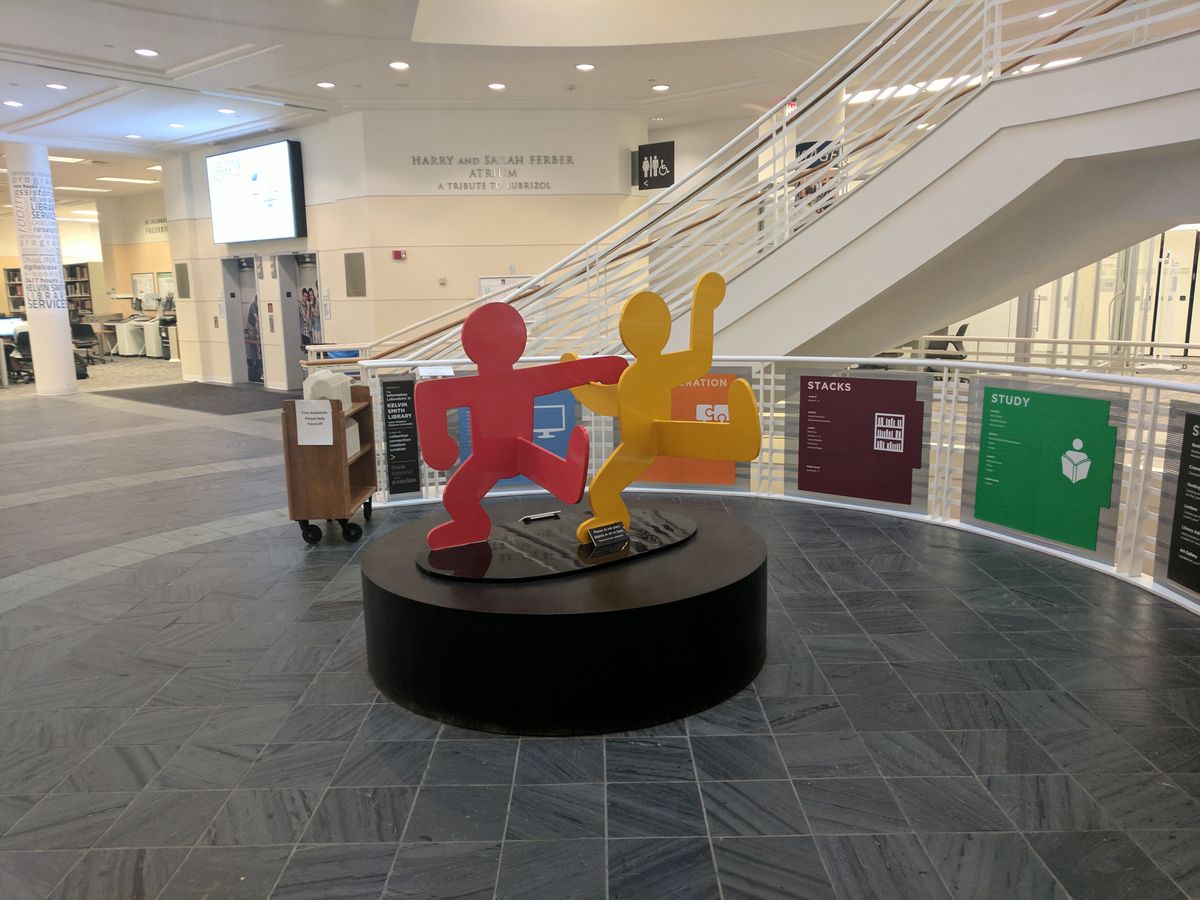We can recognize the importance of 'soft skills' while acknowledging that 'soft' has multiple associations that may be misleadingly at variance with the importance of those skills.
In this post, I look at some contexts which are making such skills both more visible and more important before making some general concluding observations. It is clear that such skills are core needs for the library which is increasingly networked, relational and community focused.
We can recognize the increasing importance of 'soft skills' while acknowledging that 'soft' has multiple associations that may be misleadingly at variance with the importance of those skills.
Soft skills, and the contributions of the (often female) library workers who demonstrate them, have often been undervalued or gone unobserved. However, the value and visibility of this work is increasingly recognised, and indeed acknowledged as central.
For example, this recognition is a major focus of the important collection The Social Future of Academic Libraries: new perspectives on communities, networks and engagement. It raises up the sometimes invisible relational work of library workers, and places it very much at the center of library operations and value.
What are soft skills? Examples are emotional and social intelligence, persuasion, team-working, empathy, communication, negotiation, networking, maintaining boundaries and self-care, conflict resolution, cultural awareness, advocacy, relationship-building. I have deliberately presented these as a random list to emphasize that there is no neat definition or bounded category here.
Seth Godin contrasts them with 'vocational' skills and suggests calling them 'real' skills:
Vocational skills can be taught: You’re not born knowing engineering or copywriting or even graphic design, therefore they must be something we can teach. But we let ourselves off the hook when it comes to decision-making, eager participation, dancing with fear, speaking with authority, working in teams, seeing the truth, speaking the truth, inspiring others, doing more than we’re asked, caring and being willing to change things. We underinvest in this training, fearful that these things are innate and can’t be taught. Perhaps they’re talents. And so we downplay them, calling them soft skills, making it easy for us to move on to something seemingly more urgent. // Seth Godin
The phrase 'soft skills' is quite problematic in several ways, including its gendered reception. I discuss some issues below. It is tempting to pre-empt that discussion and refer to such skills as CORE skills, where CORE stands for COmmunication, Relational and Empathetic, or some-such [although see my note about CORE below]. But although it sends out the right message – that what we have come to call 'soft' skills are in fact 'core' skills – it is probably too confusing.
Similarly, although I think that they might be better, I don't use 'strategic' or 'relational' or 'social' in place of 'soft.' Even though it is clear that 'soft' is hopelessly inadequate when it comes to describing some of the social/relational/strategic skills required in today's library.
Four contexts
There is a variety of contexts where the importance of soft skills is increasingly highlighted. I describe four here.
① The relational library
A frame is always useful. I find it helpful to think of an evolution from a library which is configured around the collection, to one which is configured around the civic, learning or research needs of the people it serves. The relational library is a helpful label in this context.
One could also point to David Lankes' succinct provocation: 'Bad libraries build collections, good libraries build services, great libraries build communities.'
In an academic setting, the library is interested in more directly supporting research and learning workflows, building connections with departments, instructional practice and research groups. It is also developing richer partnerships with other campus agents, which might include, for example, the center for teaching and learning, the office of sponsored research, and student success initiatives. The library, like other campus units, will be in ongoing interaction with core university functional units such as facilities or communications. What Rebecca Bryant calls social interoperability is key.
In a public library setting, the library is welcoming the community to its space with a growing variety of creative activities and events. It is partnering with social and educational services, with local charities or cultural institutions, with schools and colleges. It is reaching previously overlooked or marginalised populations, it is developing special programs for particular language groups, it is providing services for immigrants. The awareness of the role of the public library as critical social infrastructure has been elevated by the publication of Eric Klinenberg's Palaces for the People.
The library provides access to the means of creative production.
This deeper community engagement requires what we have called soft skills - communication, relational skills, cultural competence. Working with partners also involves these skills, along with persuasion, trust-building and negotiation. And given that library communities may vary quite a bit, there is a premium on flexibility and adaptability.
The use of 'soft' seems especially misleading in the context of the current realities of public library work. Bringing the community into the library means bringing the whole community into the library. And so, library workers have often to engage with community issues, including mental health, homelessness, food insecurity, and a range of social circumstances for which they may be not very well prepared.
② Challenges to value and values
In an important article about library value, Eleanor Jo Rodger characterises the public library in this way.
Similarly, public libraries are society's way of paying attention to learning and equity. In the United States we hold both in high esteem, so we fund public libraries with tax revenues. // WebJunction
This was written over twenty years ago. We are in a different political environment now. What happens when learning and equity are not held in high esteem, or their value is questioned? Or when the longstanding values or policies around collections are challenged?
At the same time value questions may be asked of all types of libraries given competing financial demands, mistaken impressions about the digital environment, and so on.
There are very big issues here, but in the context of this post, I want to note again the importance of advocacy, persuasion, storytelling, communication, and relationship building. In any discussion, it is important to understand the position of others, especially if one wants to persuade them of a particular course of action.
Such 'soft' skills don't seem very soft in this context, as the librarian interacts with the mayor, the library board, the provost or the faculty committee.
Again, the recent environment in public libraries underlines this as library workers have to be prepared to talk about collection development, events or other policies in the face of organized and persistent challenges.
③ Collaboration and partnership
Collaboration is central to library operations. Libraries also scale learning, innovation and advocacy through collaborative work. And as discussed above, libraries partner with others, whether these are other units within the parent municipality or college, or are outside.
It would actually be interesting to see some research into how much time library workers spend on collaboration and partnership. My sense is that this considerable, and that it is also growing. At the same time, libraries are looking more critically at collaboration, assessing the level of investment it requires.
At the University of Washington, I have been developing a course on library collaboration and partnerships. It has seemed to me that this is a somewhat overlooked area in library education, but also in strategy and planning, given how central it is to library operations and thinking.
In working through the course, I have been struck by how much this kind of library work also depends on what we call soft skills.
Collaboration involves communication, relationship-building, negotiation, teamwork. It involves building the trust that allows candid conversations about priorities to happen. But it is much more. Within these collaborative settings, librarians mentor colleagues from other institutions, develop confidence in committee work and presentation, and advocate for their library's interests. The social and political environments that collaborative working involves depend on 'soft' skills to work well and in turn they allow people to develop those soft skills.

A discussion of dynamics of collaborative working
④ Equity and empathy
Library workers have been stretched and stressed in very challenging ways in recent years through the pandemic, social unrest, and the real impacts of the culture wars. The murder of George Floyd made libraries and library workers recognise the need to more purposefully identify and repair harm. Librarians have had to step up to additional roles and to handle difficult situations in the workplace. Organizational and hierarchical issues have been emphasised, as, for example, in the uneven need to be physically present during the pandemic. Some may now be concerned about the uncertain impact of AI on their work, and the potential dilution of social trust and confidence as synthesized communication or creation spreads. This is especially so in this year of elections. The cumulative emotional attrition has been draining, and empathy can be difficult.
This may be leading to a change in sensibilities and expectations around libraries and the roles of library workers:
This may be unevenly manifested, but underlines the need for the library to recognize the importance of equity and empathy, in terms of both value created and values embraced. We know that libraries are social organizations supporting mental wellness, social cohesion, and personal and community development. Current experience has foregrounded these roles.
It has also foregrounded the importance of empathy and understanding in the workplace, as managers and as colleagues. Empathy, transparency and communication are central.
Writing about soft skills, Emy Nelson Decker [2020] notes a claim that "many professions that rely heavily upon empathy or listening to the needs of others (i.e. soft skills) are also notorious for burn out or "compassion fatigue."
The work of Kaetrena Davis Kendrick on empathy and self-preservation is very relevant here. See for example this WebJunction webinar with a recording and related resources.

Webinar organized by WebJunction which includes a useful collection of additional related resources
I was taken with this comment from her co-presenter, Sunnie Scarpa: 'Hire and train empathetic staff with healthy boundaries.'

The paragraphs above draw on a fuller discussion of equity and empathy in this post, from where the quote above also comes
Discussion - the new core
There has been some research about soft skills in the library field, notably by Laura Saunders. She has explored the knowledge, skills and attributes (KSAs) reported as necessary to library work. She identified eleven KSAs deemed core, and of those seven (and possibly eight depending on categorization) were general and could be considered 'soft skills.'
She makes this interesting note about importance:
This emphasis on interpersonal and communication skills seems to align with the idea of the information professions as user-centered and customer-service oriented. Partridge, Menzies et al. asserted from their findings that “personality traits, not just qualifications, were critical to be a successful librarian or contemporary information worker” (2010, p. 271), and Saunders (2015) found that some focus-group participants said they would prioritize soft skills over hard skills or content knowledge when hiring. // Saunders, 2019
This article dates from 2019 based on survey work carried out in 2017. Given the contexts described above, I imagine that soft skills would be found to be even more urgently important today.
So soft skills are critical to library work in multiple ways and to positioning the library effectively in the community it serves. However 'Soft' is potentially misleading or unhelpful in several ways. In fact the use of the word may actually be damaging in particular settings, or it may suggest something that is directly counter to the actual situation.
- It can suggest that such skills cannot be learned or taught. However, they can be, and how they should be tackled is an intriguing question for library education. In fact, mentoring is an important skill, as is a disposition to learning.
- It can suggest that such skills are less important than so-called 'hard' skills. Or are somehow easier to develop. However, as noted above, and as can be easily seen elsewhere, soft skills are very important in the workplace. And they need to be learned and practiced.
- It may mean that those who have good soft skills are less valued than those with putatively harder skills, that their opinions are less valued, or that they are pushed to the sidelines of decision-making.
- The language may reflect or support prejudices about gender, given the association that may be made between hard and soft, respectively, and masculine and feminine. Emy Nelson Decker notes: "This is particularly worrisome in a historically feminized field as is the case with library science."
- It can suggest that so-called soft and hard skills are mutually exclusive, and that one can only optimise for one. However, consider how we want to be treated in medical settings. Soft skills are important to technology workers, say, as much as to others.
- A recent Journal of Engineering Education editorial argued that it may reduce emphasis on equity and inclusion. 'Ultimately, using the term "soft skills" pushes individuals that advocate for and excel at human-focused competencies to the margins of engineering. While these skills have typically involved communication and interpersonal skills, they also involve commitments to equity and inclusion."
Dissatisfaction with the term is common. I was interested to read these two comments in the context of library collaboration.
The abilities required for collaboration tend to be poorly covered in professional competency statements, scattered around under multiple headings and also inaccurately labelled in the library literature as “soft skills”, indicating fundamental gaps in understanding that need to be addressed as a matter of urgency. // Sheila Corrall, Foreword
Most people think of collaboration as a soft skill and dismiss it with a shrug. Here’s the thing: You don’t collaborate to make people feel okay, because it’s expected of you, or to earn brownie points. You collaborate because on large-scale projects, you have no choice. // Valerie Horton, American Libraries Magazine
However, a quick search shows that this dissatisfaction spreads to the general business press and elsewhere.
While technical skills are vital, "soft skills" are the glue that holds people, teams, and business units together. These skills encompass a wide range of abilities, including communication, problem-solving, critical thinking, emotional intelligence, and teamwork. They are the foundation upon which leaders and their teams develop trust, cooperation, and high performance. // It's about time we abandoned the term 'soft skills', Forbes
The author argues for the adoption of 'professional skills' (which itself might be challenged by some). The piece by Seth Godin I reference above is worth reading in full in this context.
That said, changing the name is unlikely to happen quickly or universally. I think we would benefit from an alternative term which is generally understood. However, the bigger immediate issue is value, recognition and preparation.
For the library community, soft skills are core, and critical to the success of the relational, community focused library. They are essential and valuable skills for all library workers. And what we might have called soft skills are now needed in some very difficult front-line situations where the values of the library are challenged or where library workers are engaging with social issues and stressed populations.
This importance should be recognised ... and not only performatively. But recognised in reality, with focused systematic attention when it comes to review, professional development, promotion, recruitment, human resourcing plans, strategies, job boundaries, and so on.
And it should be recognized that soft skills are not only essential, but they are very hard.
Some references
Berdanier, C. G. P. (2022). A hard stop to the term “soft skills.” Journal of Engineering Education, 111(1), 14–18. https://doi.org/10.1002/jee.20442
Corrall, S. (2024). Foreword: The Network is the Message. In S. Pavey, The Networked Librarian: The School Librarian’s Role in Fostering Connections, Collaboration and Co-creation Across the Community. Facet.
Decker, E. N. (2020). The X-factor in academic libraries: the demand for soft skills in library employees. College & Undergraduate Libraries, 27(1), 17–31. https://doi.org/10.1080/10691316.2020.1781725
Horton, V. (2021). The Necessity of Collaboration. American Libraries Magazine. https://americanlibrariesmagazine.org/2021/11/01/the-necessity-of-collaboration/
Kendrick, K. D., & Scarpa, S. (2023, June 29). Low Morale in Libraries: Impacts and Countermeasures [Webinar recording and materials]. https://www.webjunction.org/events/webjunction/low-morale-in-libraries.html
Rodger, E. J. (2002). Value and Vision. American Libraries, 33(10). https://www.webjunction.org/documents/webjunction/Value_and_Vision.html
Saunders, L. (2019). Core and More: Examining Foundational and Specialized Content in Library and Information Science. Journal of Education for Library and Information Science, 60(1), 3–34. https://doi.org/10.3138/jelis.60.1.2018-0034
Saunders, L., & Bajjaly, S. (2022). The Importance of Soft Skills to LIS Education. Journal of Education for Library and Information Science, 63(2), 187–215. https://doi.org/10.3138/jelis-2020-0053
Photograph: I took the picture at the University of Washington, where I am currently based in the Information School.
Acknowledgements: I am grateful to Sari Feldman, Alicia Salaz, and Sharon Streams who generously commented on a draft.





